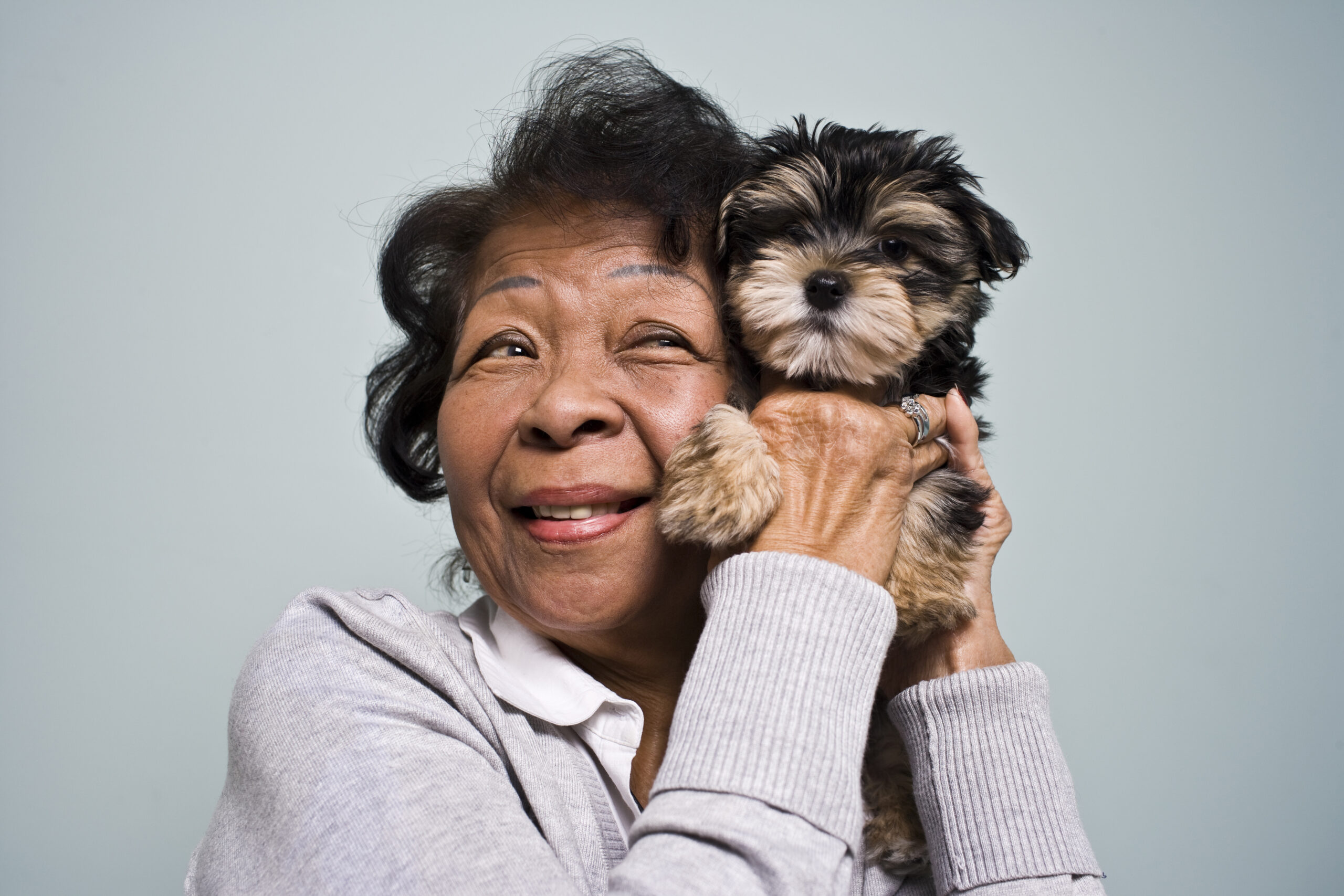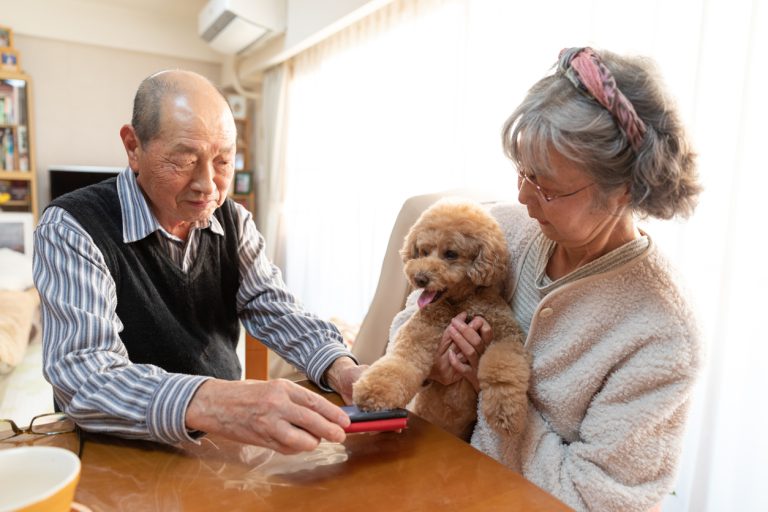Feeling isolated or lonely is common among older adults. Empty nesters may find their house too quiet once their children have grown and moved away, or a widowed senior may struggle with finding companionship. Some elderly people may participate in senior-friendly activities or become more active at the local senior center. Other elderly adults may desire more constant companionship, like a pet.
Adopting a dog can have a lot of benefits for an older adult, whether they live alone, with a spouse, or even in a residential care facility for seniors, like an assisted living home. We're exploring some considerations for seniors seeking a canine companion and tips on what kinds of breeds may be better for seniors.
Why are Dogs Great Companions For Older Adults?
The old saying goes, “A dog is a man's best friend.” It is easy to see why. Pets are non-judgemental and demonstrate unconditional love. Experiencing the excitement when you walk in the door is a prime example of the mutually beneficial effects of the feelings of the joy your pet can bring.
Low-impact exercise is necessary for older adults to maintain health, mobility, and balance. Walking a dog twice daily is a great way to get outside and walk around the neighborhood or at a local park. When you're walking your dog, you may see other pet owners out and about, which allows you to get to know your neighbors or meet other dog-lovers on your block.
Many communities have dog parks and playgrounds where friendly, appropriately-trained dogs can run around off their leashes. Your dog may enjoy playing with others, and you can socialize with other dog owners at the park. Before taking your dog to a dog park, check with their vet to ensure they're up-to-date on shots and that the dog is ready to socialize with other dogs.
Caring for an animal, taking it for walks, and even trips to the local dog park can help give an elderly adult a sense of purpose. Many seniors struggle with finding a sense of purpose in life after they've retired and their children have grown up. Lack of a sense of purpose can contribute to declining mental health or even depression. Caring for an animal that relies on them can help your older relative live a more purposeful life.
Considerations When Selecting a Dog For a Senior
Although caring for a dog has many benefits for older adults, there are a few things to consider before you and your senior start picking out puppies. Caring for a dog is an active job – the animal will usually require walks twice daily for exercise. Plus, you'll have to be able to collect the dog's waste when it uses the bathroom. Tools like a scooper on a stick can help seniors who cannot bend over to the ground to pick up waste, but this is a consideration.
If you live in leased housing, like a senior living property, rental home, or an apartment or townhouse, there could be pet policies you must comply with. Many places restrict the type of animal you can have, the weight of the animal (typically there is a 25lb weight limit), and the breed of dog. Property owners that do allow tenants to have pets may also assess a pet deposit and extra monthly fees. Before adopting a dog, check with your landlord.
If you've never owned a dog, you may not know whether you're allergic or not. You could take an allergy test at an allergist or spend more time around dogs. Some breeds, like Labradoodles, are hypoallergenic (their dander doesn't cause an allergic reaction in most people), but be sure you can tolerate a dog before adopting.
Finally, consider how active the dog will be. Frail seniors may be unable to control a larger breed, like a Great Dane or even a Labrador. Or, certain herding breeds, like Shepherds, may not be a good choice for seniors since these are very active "working" breeds.
Top Six Breeds for Seniors

Seniors who want a dog breed with certain traits that are more compatible with their lifestyle might wish to look for a breeder instead of adopting a mixed or unknown breed from an animal shelter. Some breeders may be able to match seniors with a more docile pup, as well.
The top six breeds for seniors are:
Shi-Tzu – small, social, good with children. The long-haired Shi-Tzu may need regular professional grooming and daily brushing. Daily dog grooming may help seniors preserve fine motor skills. It's a friendly dog and small enough to be a good companion for grandchildren.
Pug – enjoy lounging, less active than other breeds. Pugs may not need to be walked as far or as often and are quite content simply cuddling with their owners on the couch, which a less-active senior may prefer.
Corgi - small, social, but very active. A Corgi is energetic and may be more appropriate for a more active senior. They love to play and can be a great breed to take to the dog park.
Poodle – intelligent and hypoallergenic but active. Standard-sized poodles are larger dogs who do best with plenty of exercises. They are intelligent and more easily trainable than other breeds.
Schnauzer – friendly, good with children, enjoys long walks. Sweet Schnauzers require daily brushing and professional grooming and are very gentle with smaller children.
Greyhound – calm, content to lounge, not hyperactive. Despite their reputation as racing dogs, when "at home," Greyhounds are fairly low-maintenance. Some seniors may wish to adopt greyhounds retired from racing.
Do You Need an Emotional Support Animal?
Some seniors may suffer from depression, anxiety, PTSD, or another mood disorder, which an emotional support animal (ESA) can help with. Many people incorporate an ESA with their holistic mental health therapy. ESAs are also helpful for people who are experiencing grief and loss. If you're regularly seeing a therapist or counselor, they may be able to help you learn more about how an emotional support dog can improve your quality of life.
And, ESAs, animals that are listed as part of your treatment plan by a Licensed Mental Health Provider, are also protected under the U.S. Fair Housing Act, which means that you may be allowed to live with your animal in a place you otherwise would not be.
Pet-Friendly Accommodations With Assisted living Locators
If you're seeking long-term senior living accommodations at a pet-friendly property, we can help. Assisted Living Locators can help seniors find the right pet-friendly fit for their senior housing.



